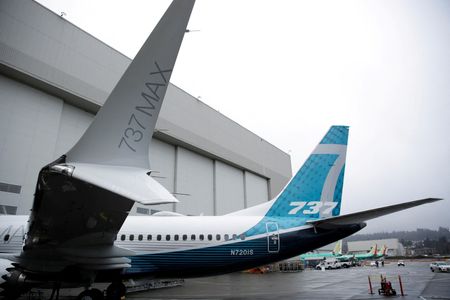By David Shepardson
WASHINGTON (Reuters) – The Federal Aviation Administration (FAA) told Boeing Co that some key documents submitted as part of the agency’s ongoing certification review of the 737 MAX 7 are incomplete and others need a reassessment by the U.S. planemaker.
In an Oct. 12 letter to Boeing from FAA official Ian Won seen by Reuters, the agency asked Boeing to reassess some assertions that hazards classified as catastrophic “do not contain human factors assumptions.”
The FAA also said it was unable to complete some reviews of Boeing submissions “due to missing and incomplete information regarding human factors assumptions in catastrophic hazard conditions.” The new letter intensifies concerns about the company’s timeline for beginning deliveries of the smaller variant of the best-selling MAX.
Boeing faces a late December deadline for the FAA to certify the MAX 7 and MAX 10 or it must meet new modern cockpit alerting standards that could significantly delay the airplanes unless the company receives a waiver from Congress.
The requirements were approved by Congress in late 2020 as part of FAA certification reforms after two fatal 737 MAX crashes killed 346 people and led to the bestselling plane’s 20-month grounding.
Reuters first reported on Oct. 3 Boeing does not anticipate winning approval for the MAX 10 before next summer, citing an FAA sent to Congress.
Boeing said in a statement Monday it “is focused on meeting all regulatory requirements to certify the 737-7 and safety remains the driving factor in this effort.”
Certifications of planes require extensive paperwork submissions and detailed review of safety assessments by the FAA.
In a Sept. 19 letter to Boeing, the FAA expressed concerns that the planemaker would not be able to win certification for the MAX 7 this year. Boeing must get approval for the MAX 7 first as the MAX 10 approval is contingent on some MAX 7 documentation, Boeing Chief Executive Dave Calhoun said last month.
The planemaker added it will “continue to prioritize being thorough and transparent in our documentation and interactions with the FAA.”
Human factors analyses refer to how pilots respond to cockpit emergencies. The FAA letter said Boeing must as part of its review assure the agency “that those safety assessments do not contain human factors assumptions” and if there are others it must identify them and submit them for review.
A December 2020 Senate report into the MAX concluded the FAA and Boeing “had established a pre-determined outcome to reaffirm a long-held human factor assumption related to pilot reaction time … It appears, in this instance, FAA and Boeing were attempting to cover up important information that may have contributed to the 737 MAX tragedies.”
The Wall Street Journal reported the letter earlier.
(Reporting by David Shepardson; Editing by Kim Coghill and Stephen Coates)

